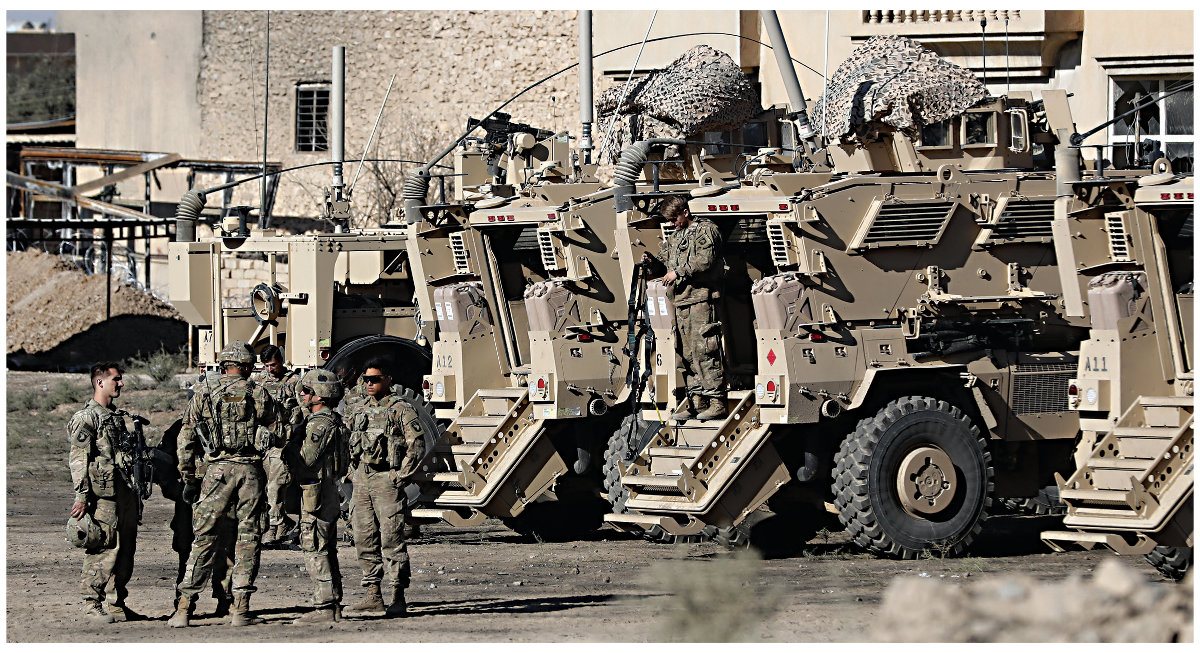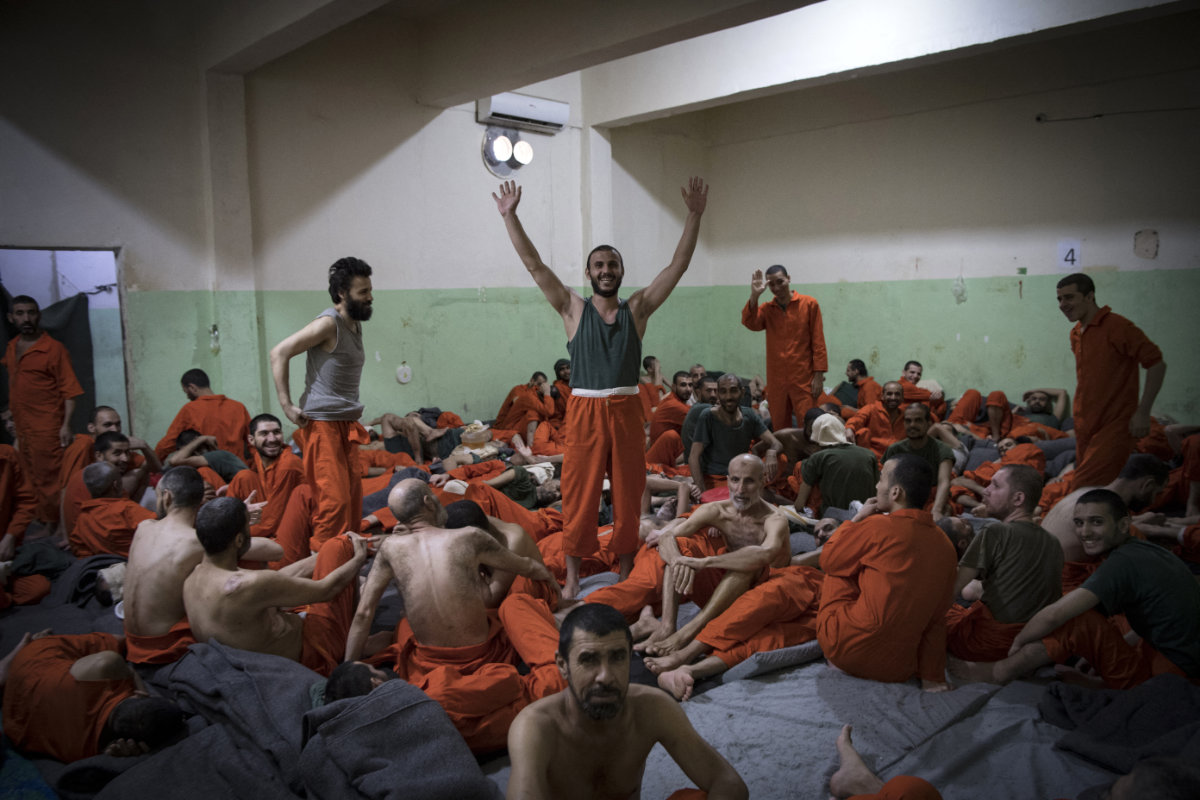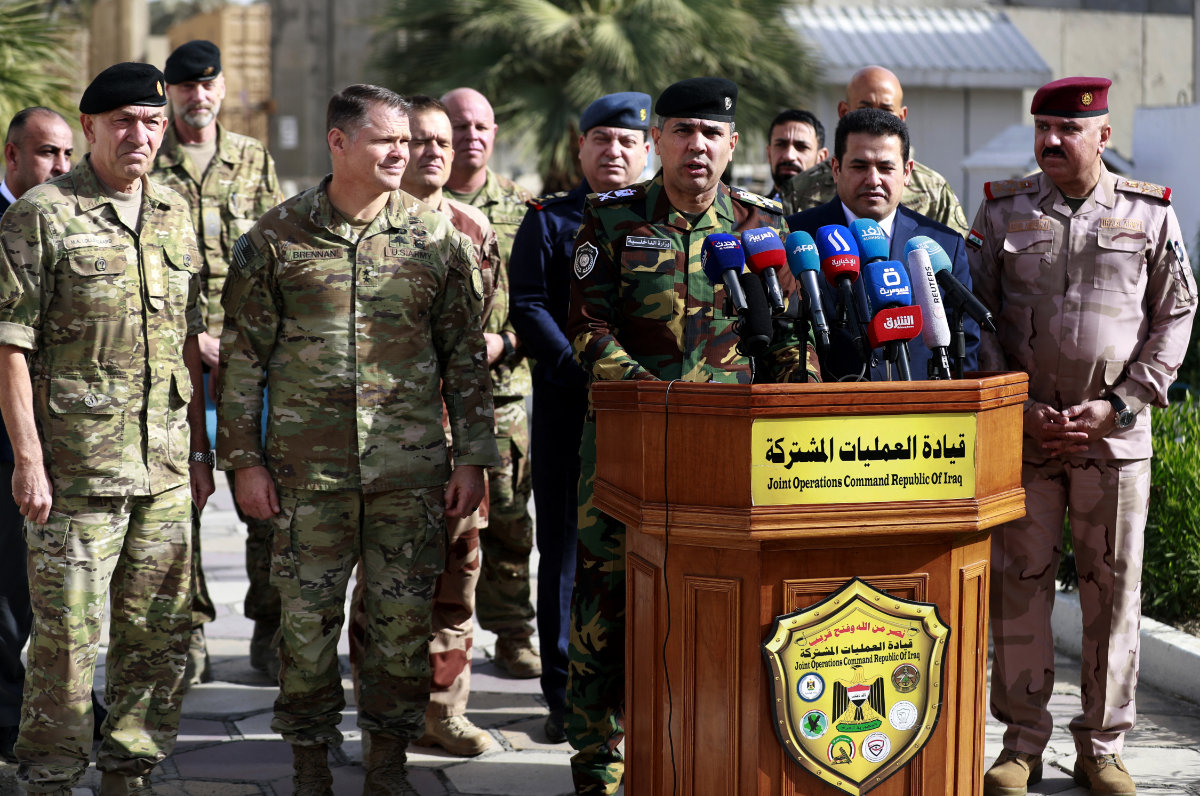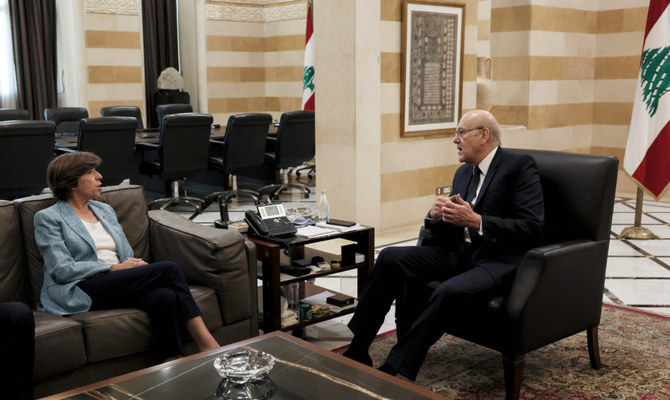PARIS: France’s foreign minister travels to Lebanon on Saturday as part of diplomatic efforts by President Emmanuel Macron’s government to help contain the Middle East conflict.
Fears of a widening war have been growing, with Iran-backed groups targeting US and allied forces in Iraq and Syria, and daily exchanges of fire along Israel’s border with Lebanon.
“We must avoid a regional eruption,” foreign ministry spokesman Christophe Lemoine said ahead of Foreign Minister Catherine Colonna’s trip.
Colonna will call for “restraint” and “responsibility” to avoid a new front line on the Israeli-Lebanese border, he said.
There have been near-daily cross-border exchanges between Hezbollah, an Iran-backed Hamas ally in Lebanon, and Israel since the Palestinian group’s unprecedented October 7 attacks on Israel that Israeli officials say killed about 1,200 people, mostly civilians.
In response, Israel vowed to destroy Hamas and launched an unrelenting military offensive on Gaza that has left swathes of the besieged Palestinian territory in ruins. The health ministry in the Hamas-run strip says more than 18,700 people have been killed.
Along the Israel-Lebanon border violence has remained relatively limited, with 128 killed in total, including 90 Hezbollah combatants and at least 11 Israelis.
French officials are also seeking the release of the French hostages among the around 240 seized by Hamas militants, as the Israeli army announced Friday that it had recovered the body of French-Israeli hostage Elya Toledano, a 28-year-old seized at a desert rave party when the attack occurred.
Hamas released dozens of hostages in exchange for Palestinian prisoners held by Israel during a week-long truce last month, but several are still being held and others have been found dead.
Colonna said her country was “deeply saddened to hear the Israeli armed forces announce the death of our compatriot Elya Toledano, a Hamas hostage whose body was found in Gaza.”
“We share the grief of his family and loved ones. The release of all hostages is our priority,” she wrote on X.
But Israel has stepped up its shelling while issuing warnings to the Hezbollah leadership.
“If Hezbollah chooses to wage a full-fledged war on us, then it will transform, with its own hands, Beirut and South Lebanon into Gaza and Khan Yunis (a city in southern Gaza),” Prime Minister Benjamin Netanyahu said last week during a visit to troops along the Lebanese border.
Western governments, notably the United States and France, are stepping up behind-the-scenes diplomatic efforts to stop the situation from worsening.
The risk of full-out war is “very real” if the Lebanese side underestimates Israel’s determination to protect its borders in the aftermath of the traumatic October attack, a French diplomatic source said.
But French diplomats and security officials also believe that Israel needs to be reminded that any wider conflict would not guarantee regional security, the source said.
Colonna will therefore “reiterate French appeals for responsibility and restraint,” Lemoine said.
The head of the French external intelligence service, Bernard Emie, gave a similar message when he met Lebanese officials in Beirut last week.
Israel’s current objective is that Hezbollah forces move back from the border by 40 kilometers (25 miles), a Western diplomatic source in Beirut said.
In particular, they want Hezbollah’s elite Al-Radwan unit, equipped with heavy artillery, to back off, said the source, requesting anonymity.
Hezbollah meanwhile says it has no visible presence in the border region.
France maintains that the United Nations Security Council’s resolution 1701, which states that only the official Lebanese army and the UN’s UNIFIL force can be deployed in southern Lebanon, is a promising basis for discussions.
This stance is shared by Israel, but Hezbollah’s second-in-command Naim Qassem said this week that “we won’t discuss any deployment in southern Lebanon with anybody while the attack on Gaza continues.”
The Western diplomatic source said mediation efforts are focusing on settling an ongoing border dispute between both countries, by which Israel would withdraw from farms in the town of Chebaa and from the Lebanese part of the village of GHajjar.
France is the biggest contributor to UNIFIL with 700 soldiers, to whom Colonna could pay a visit on Saturday.
The UN force has been targeted by Israeli fire since the start of the violence, with France condemning “any violation of the safety” of the UN soldiers.
Colonna is scheduled to travel to Israel and the occupied West Bank on Sunday.
France steps up Mideast effort with FM’s Lebanon trip
https://arab.news/4sms6
France steps up Mideast effort with FM’s Lebanon trip

- “We must avoid a regional eruption,” foreign ministry spokesman Christophe Lemoine said ahead of Foreign Minister Catherine Colonna’s trip
- Colonna will call for “restraint” and “responsibility” to avoid a new front line on the Israeli-Lebanese border
Medical NGO blames new US aid group for deadly Gaza chaos

- Humanitarian aid must be provided only by humanitarian organizations who have the competence and determination to do it safely and effectively
RAFAH, Palestinian Territories: Medical charity Doctors Without Borders said Sunday that people it treated at a Gaza aid site run by a new US-backed organization reported being “shot from all sides” by Israeli forces.
The NGO, known by its French name MSF, blamed the Gaza Humanitarian Foundation’s aid distribution system for chaos at the scene in the southern Gaza town of Rafah.
Gaza’s civil defense agency said Israeli fire killed 31 Palestinians at the site. Witnesses told AFP the Israeli military had opened fire.
The GHF and Israeli authorities denied any such incident took place but MSF and other medics reported treating crowds of locals with gunshot wounds at the Nasser hospital in the nearby town of Khan Younis.
“Patients told MSF they were shot from all sides by drones, helicopters, boats, tanks and Israeli soldiers on the ground,” MSF said in a statement.
MSF emergency coordinator Claire Manera in the statement called the GHF’s system of aid delivery “dehumanizing, dangerous and severely ineffective.”
“It has resulted in deaths and injuries of civilians that could have been prevented. Humanitarian aid must be provided only by humanitarian organizations who have the competence and determination to do it safely and effectively.”
MSF communications officer Nour Alsaqa in the statement reported hospital corridors filled with patients, mostly men, with “visible gunshot wounds in their limbs.”
MSF quoted one injured man, Mansour Sami Abdi, as describing people fighting over just five pallets of aid.
“They told us to take food — then they fired from every direction,” he said. “This isn’t aid. It’s a lie.”
The Israeli military said an initial inquiry found its troops “did not fire at civilians while they were near or within the humanitarian aid distribution site.”
A GHF spokesperson said: “These fake reports have been actively fomented by Hamas,” the Islamic militant group that Israel has vowed to destroy in Gaza.
Algeria ‘regrets’ Britain backing Morocco autonomy plan for W.Sahara

- “Algeria regrets the choice made by the United Kingdom to support to the Moroccan autonomy plan
ALGIERS: Algeria’s foreign ministry said it “regrets” Britain’s decision on Sunday to support Morocco’s automony plan for the disputed territory of Western Sahara, overturning a decades-long policy in favor of self-determination.
“Algeria regrets the choice made by the United Kingdom to support to the Moroccan autonomy plan. In 18 years of existence, this plan has never been submitted to the Sahrawis as a basis for negotiation, nor has it ever been taken seriously by the successive UN envoys,” the ministry said in a statement.
Egypt’s foreign minister urges end to Israeli war in Gaza during call with Witkoff

- Badr Abdelatty emphasized that a just and lasting solution to the Israeli-Palestinian conflict requires a comprehensive political settlement
- He said alleviating the humanitarian suffering in Gaza must be a priority for the international community
LONDON: Egypt's Foreign Minister, Badr Abdelatty, stressed the urgent need for an immediate cessation of Israeli aggression against the Gaza Strip during a phone call with Steve Witkoff, the US President's Special Envoy to the Middle East.
Abdelatty emphasized that alleviating the humanitarian suffering in the Palestinian coastal enclave must be a priority for the international community and called for unconditional access to humanitarian aid.
He emphasized that a just and lasting solution to the Israeli-Palestinian conflict requires a comprehensive political settlement that aligns with President Trump's vision for sustainable peace in the Middle East, the Emirates News Agency reported.
Abdelatty was a member of the Ministerial Committee designated by the Joint Extraordinary Arab-Islamic Summit on Gaza, which Israel prevented from visiting the occupied West Bank on Sunday to meet with Palestinian officials in Ramallah.
Arab ministers from Saudi Arabia, Bahrain, Jordan, and Egypt, along with the Secretary-General of the Arab League, condemned what they described as the "arrogant" decision by Israel to block their visit and its rejection of any peace efforts.
Is Iraq ready to stand alone against extremist threats if US withdrawal goes ahead?

- Decades of training and investment have improved security forces, but critical capability gaps remain
- Analysts warn premature pullout could erase progress against extremism and empower armed groups
LONDON: When Daesh extremists seized control of swathes of Iraqi territory in 2014, many wondered whether the onslaught could have been prevented had US troops not withdrawn from the country three years earlier.
As the militants surged into Iraq’s second-largest city, Mosul, there were reports of members of the Iraqi Security Forces stripping off their uniforms as they fled.
“We can’t beat them,” an unnamed army officer told Reuters amid the chaos. “They are well-trained in street fighting, and we’re not. We need a whole army to drive them out of Mosul.”
After three years of fierce fighting that took Daesh within 25 kilometers of the capital, Baghdad, the extremists were finally driven back and Mosul was liberated.
The gargantuan military effort was spearheaded by Iraq’s elite Counter Terrorism Service, bolstered by the return of American troops and the US Air Force.

Images of the destruction in Mosul, along with the catastrophic impact of Daesh’s occupation, might be playing on the minds of Washington officials as they once again weigh whether or not to remove American troops still stationed in Iraq.
As it stands, the US and Iraq have agreed to end Operation Inherent Resolve — the US-led coalition’s mission to combat Daesh — by September. Most of the 2,500 US personnel in Iraq are scheduled to leave in the initial phase, with a small number remaining until 2026.
Many believe US President Donald Trump, acting under his isolationist tendencies, will want to hasten the withdrawal of those forces, or is unlikely to extend their stay if the Iraqi government requests it.
With reports of an increase in attacks by Daesh sleeper cells, fears of instability across the border in Syria, and with Iran looking to shore up its proxy militias in Iraq, there are concerns that another complete US withdrawal will once again leave the country vulnerable.
“The risk of premature withdrawal from Iraq is that the Iraqi Security Forces will lose critical operational and tactical support, and Daesh will seize the opportunity to reconstitute and once again terrorize the Iraqi people and state,” Dana Stroul, research director at the Washington Institute for Near East Policy and a former Pentagon official, told Arab News.
The mooted withdrawal of US troops comes more than 20 years after the US-led invasion of Iraq toppled Saddam Hussain, freeing the country from dictatorship, but ushering in a period of sectarian civil war.

US forces were drawn into cycles of violence and routinely became the target of two mutually antagonistic sectarian forces: Iran-backed militias and an insurgency in which Al-Qaeda played a prominent role.
When President Barack Obama took office in 2009, he vowed to end US involvement in the conflicts in Iraq and Afghanistan, but not without first ordering a massive troop surge in an attempt to salvage the mission.
In Iraq, where more than 100,000 people were estimated to have died in the violence, there was widespread public anger at the American presence. In the US, the war was also deeply unpopular with thousands of American soldiers having been killed.
Some American and Iraqi officials wanted to maintain a US military presence in the country, fearful of an Al-Qaeda resurgence. But attempts to negotiate an agreement for a reduced force failed and in October 2011 Obama announced that all of the remaining 39,000 US troops would be withdrawn by the end of that year, bringing a close to the mission.
The US spent $25 billion on training and equipping Iraq’s security forces up to September 2012, alongside Iraq’s own spending on fighter jets and other advanced materiel. So it was something of a surprise that Iraqi forces were so quickly overrun when Daesh launched its offensive in 2014, having emerged from the remnants of Al-Qaeda in Iraq.
Images of Daesh fighters driving around in US armored vehicles captured from the Iraqi military symbolized how quickly Iraq’s armed forces had deteriorated since the 2011 withdrawal.

As the extent of Daesh’s brutality began to emerge, including the slaughter of the Yazidi minority and the beheading of Western hostages on YouTube, the US ordered its forces back to the region, as part of an international coalition, to fight the extremists in both Iraq and Syria.
After some of the most brutal urban warfare seen since the Second World War, Iraq’s then-prime minister, Haider Al-Abadi, declared the territorial defeat of Daesh in December 2017. US forces continued to help their allies in Syria to defeat the extremists there in March 2019.
By December 2021, US forces in Iraq no longer held combat roles, instead working on training, advisory, and intelligence support for the country’s military. The remaining 2,500 US troops are spread between Baghdad, Irbil in the semi-autonomous Kurdistan region, and Ain Al-Asad air base.
However, soon after Al-Abadi’s declaration of victory over the extremists, a new threat emerged in Iraq in the shape of Iran-backed militias, originally mobilized to help defeat Daesh. Having extended their reach over Sunni and Kurdish areas, these groups began attacking US bases with rockets and drones in a bid to force their immediate withdrawal.

These attacks, sponsored by Iran’s powerful Islamic Revolutionary Guard Corps, prompted President Trump, during his first term, to order the killing of militia chief Abu Mahdi Al-Muhandis and Iranian Quds Force commander Qassem Soleimani in a drone strike on their motorcade as they left Baghdad Airport on Jan. 3, 2020.
Soleimani’s death was a major setback for Iran’s proxies throughout the region, but the attacks on US positions did not subside. In fact, with the onset of the war in Gaza in October 2023, Iraq’s Shiite militias mounted a fresh wave of strikes, ostensibly in support of Hamas.
The deadliest of these occurred on Jan. 28, 2024, when three US personnel were killed and 47 wounded in a drone attack on Tower 22 just over the border in Jordan, prompting then-US president, Joe Biden, to order a wave of airstrikes on militia positions in Iraq.
Mindful of the need to protect its proxies in Iraq, at a time where Lebanon’s Hezbollah and Yemen’s Houthis have been weakened and the sympathetic Assad regime in Syria has fallen, Iran appears to have forsworn further militia strikes on US forces.

The latest agreement to end the US presence was reached in September last year with the aim of moving to a fully bilateral security partnership in 2026.
Meanwhile, the US Defense Department announced in April it would be halving the number of troops in northeast Syria “in the coming months.”
An indication of Trump’s aversion to the continued US military presence came during a speech in Saudi Arabia while on his tour of the Gulf in May when he decried “Western interventionists.”
A clear concern surrounding a US withdrawal is whether Iraq’s security forces are now strong enough to withstand threats like the 2014 Daesh assault. The disastrous withdrawal from Afghanistan in August 2021 is also no doubt fresh in the minds of defense officials.
A recent report by the New Lines Institute think tank in New York said that a US withdrawal from Iraq would “heavily impede the intelligence and reconnaissance collection, artillery, and command-and-control capabilities of Iraqi military forces.”
The report studied quarterly independent audits for the US Congress between 2019 and 2024 to assess the capabilities of Iraqi forces. It looked at the three main forces in Iraq: the Iraqi Security Forces, Counter Terrorism Service, and the Kurdish Peshmerga.
The report said: “While segments of Iraq’s military, such as the CTS and Kurdish security forces, have proven efficient in counterterrorism operations, several gaps exist in Iraq’s conventional capabilities, including artillery, command and control, inter- and intra-branch planning, and trust.”

The think tank said there were serious questions about whether Iraq’s security forces would be able to “hedge against internal and external challenges” in the absence of the US security umbrella.
The report’s co-author Caroline Rose, a director at New Lines, says the gaps in Iraqi capabilities “could reverse over a decade of progress that Operation Inherent Resolve has made in Iraq.”
“If the objective is still to advance Iraqi forces’ operational capacity, sustain gains against Daesh, and serve as a ‘hedge’ against Iranian influence, there is work still to be done,” she told Arab News.
While Iraq has enjoyed a period of relative stability, the threats to its national security continue to lurk within and beyond its borders.
The biggest fear is of a Daesh resurgence. Although the group has been severely depleted, it continues to operate cells in rural areas of Iraq and Syria, and has since made headway in Afghanistan, the Sahel, and beyond.
“Since January, the US military is still actively supporting the Iraqis,” said the Washington Institute’s Stroul. “There have been monthly operations against Daesh, including the killing of a senior leader in western Iraq. This tells us that Daesh is still a threat, and the US support mission is still necessary.”

Another concern is that instability in Syria, where the embryonic, post-Assad government is facing significant security challenges, could again provide a breeding ground for Daesh that could spill across the border.
“There are still 9,000 Daesh detainees held in prison camps in northeast Syria,” said Stroul, adding that these present “a real risk of prison breaks that will replenish Daesh ranks and destabilize Syria, Iraq, and the rest of the region. If the security situation deteriorates in Syria, this will have seriously negative impacts in Iraq.”
And then there is the ongoing threat posed by Iran-backed militias. While these militias have been officially recognized as part of Iraq’s security apparatus, some believe the US presence in Iraq helps keep them — and, by extension, Iran — in check.
“The staging of US forces and equipment, combined with a deep Iraqi dependence on American technical and advisory support, creates an obstacle and point of distraction for Tehran and its proxies,” Rose said.
If the withdrawal of US troops from Iraq is inevitable, then how can Washington best prepare Iraq to go it alone?
For Rose, the US should play a “long game” to sustain security ties with Iraq and preserve the progress made under Operation Inherent Resolve.
She recommended the US continue investing in Iraq’s defense and security, conducting regular joint military exercises, and using its current presence in Irbil and Baghdad to build strong relations with security officials.
She also advised other international bodies, like the NATO Mission-Iraq and the EU Advisory Mission Iraq, to coordinate closely with the US as the drawdown gets underway.

Although the US appears set on pivoting away from the region to focus strategic attention on the Asia-Pacific, some still hope there could be a way for America to maintain some form of military presence, given the rapidly evolving situation in the wider Middle East.
Reports earlier this year suggested some senior Iraqi politicians aligned with Iran privately want a US presence to continue, at least until ongoing US-Iran nuclear talks reach a conclusion.
“The US military mission is one of support, advice, and assistance by mutual consent of Baghdad and Washington,” Stroul, of the Washington Institute, said. “If the Iraqi government invites the US military to remain for some period of time, there should be agreement on the supporting role that the US can play.”
If Iraq hopes to maintain lasting stability, it needs to ensure its security forces can act alone to protect the country and population from internal and external threats.
Continuing to work with the world’s foremost military power, even in a limited capacity, would go some way to ensuring the horrors of 2014 are not repeated.

Egypt unveils plan for new desert city in latest megaproject

- The new city, named Jirian, meaning “Flow” in Arabic, is part of Egypt’s Nile Delta scheme, a massive agricultural initiative to reclaim about 2.5 million acres west of the original Nile Delta
CAIRO: Egypt has unveiled plans for a vast new urban development west of Cairo where a man-made channel of the River Nile will eventually wind through what was once arid desert.
The new city, named Jirian, meaning “Flow” in Arabic, is part of Egypt’s Nile Delta scheme, a massive agricultural initiative to reclaim about 2.5 million acres west of the original Nile Delta.
The ambitious agricultural project, which started in 2021, seeks to boost production of strategic crops such as wheat and corn while reducing the North African country’s food import bill.
The project is the latest in a string of megaprojects launched by President Abdel Fattah El-Sisi in recent years, including a new administrative capital east of Cairo.
While officials say these projects are key to Egypt’s long-term growth, they have also contributed to the country’s soaring foreign debt, which quadrupled since 2015 to reach $155.2 billion by late 2024.
The country has also received billions of dollars from the International Monetary Fund and the EU to ensure its financial stability, with the EU pledging billions more last month.
At a launch event on Sunday, Egyptian Prime Minister Moustafa Madbouli called the Jirian project “an urban and development revolution.”
He added that it would create 250,000 jobs and serve as the cornerstone of a wider development zone equivalent in size to four to five governorates.
“We are talking about full-spectrum development,” he told reporters, describing a sprawling urban zone that will include industry, logistics hubs, and homes for “between 2.5 and 3 million families.”
The government did not disclose the project’s total cost, which is being developed in partnership with three major Egyptian real estate firms.
The new Nile Delta project comes at a time when Egypt is already under pressure to secure its water future.
With 97 percent of its fresh water sourced from the Nile, the country has been locked in a years-long dispute with Addis Ababa over the Grand Ethiopian Renaissance Dam, which Cairo fears could reduce downstream water flows.






















